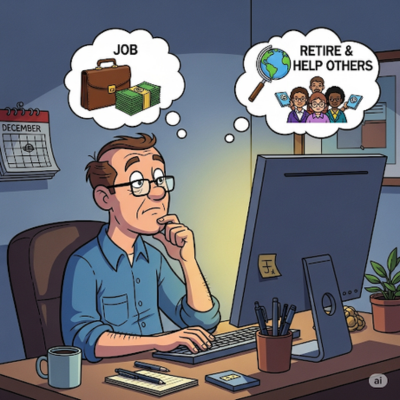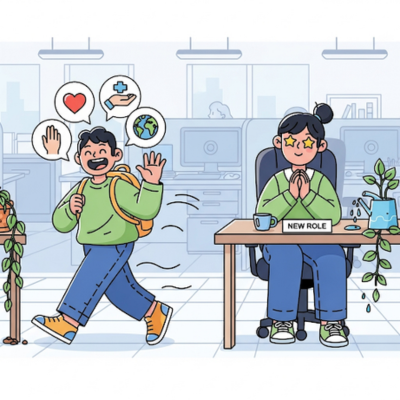Contributing To Society in Early Retirement
When I hear people contemplate whether or not to leave the workforce early, say in their 40s or 50s, there are a few things that they seem to consider before calling it quits. Money is of course usually one of the major factors. So is deciding what types of things they plan on doing with their time, who they plan on spending time with, and there is usually at least some talk about health. But one factor I find fascinating is a feeling of obligation to continue to work before they hit traditional retirement age. I’ve heard it mentioned that people feel like they owe it to society to have a job. I’m no expert in this area, but I’m just going to share a few thoughts that come to my mind on the subject, and how it might relate to my own future.
Contributing To Society
When I hear the idea that people feel they have an obligation to society to hold a job, or even a desire to contribute toward society, it makes me think of the quote from U.S. president John F. Kennedy’s inaugural address on January 20, 1961, where he says
“And so, my fellow Americans: ask not what your country can do for you–ask what you can do for your country.
My fellow citizens of the world: ask not what America will do for you, but what together we can do for the freedom of man.”
Although the United States and the world have changed over the more than 60 years since the speech, those words still provide inspiration for many, and perhaps a sense that everybody has a part to play to make the world a better place.

A Paid Job
Making money from a job does not translate directly into contributing to a greater good. There is a wide variety of paid jobs out there, and the people working the jobs all feel different levels of satisfaction and happiness from their jobs. Some people hate every second of their job and feel a lack of purpose in what they do, while others may feel fantastic at the end of every shift and that people and the world are a better place because of what they do every day. Most people are probably somewhere in between.
If a paid job is no longer fun or fulfilling and the individual is no longer reliant on income, then I think most people would understand if they decide to pivot to something else that they feel more passionate about. Now, it is much easier said than done for many to leave the workforce entirely at a younger age, but hopefully most people can comprehend the need to leave a job that is physically and/or mentally draining.
For those afraid of giving up fun and/or fulfilling jobs, I can see this as a tough place to be. This might be me when I eventually invest enough to retire. I enjoy my job, feel that I’m helping others out, I like who I’m working with, I have a decent amount of vacation, and it’s pretty rare that I work beyond 40 hours a week.
Leaving this situation could be tough in my 60s, but it might be much harder if/when I reach this point in my 50s. It’s still a ways away and I’m sure I’ll be in a different spot physically and psychologically at that point than I am now, but I’ll be thinking through different options as I approach Financial Independence.

Options When Keeping The Job
Obviously there is nothing to say that you can’t keep your job beyond Financial Independence. If I end up keeping my job beyond the point of needing it, there are a few options that might become available for me, while allowing me to do work I like and get satisfaction from, and work with people I enjoy.
I wonder if I’ll consider reducing my hours, or at least seeing if that’s an option. This may allow me to keep some benefit coverage, but also would give me more time to spend with family and friends. This could perhaps give me the time to seek out more adventures and endeavors that I haven’t had time to pursue, and help me transition to the next stage in my life.
I also could try to gradually move ownership of my work responsibilities to others, and maybe even come up with a set date to tell everybody a year or more in advance. This might help make the transition of leaving much easier, both for myself and my colleagues.
Disadvantages Of Keeping The Job
I don’t think that people always consider disadvantages of keeping a job beyond needing it. In many cases, society may benefit from a timely departure. I’ll use my own situation as an example.
Although I am pretty good at my job, I am by no means amazing at it. When I leave, someone else that is either not happy with their job or didn’t have one, or maybe is looking for a new challenge, will get a chance to learn and put their own perspective and expertise into the job I currently have. They’ll be able to help others and society as a whole in a way that otherwise wouldn’t have occurred.
If I leave, I’ll also be able to spend more time helping others in a way I wouldn’t have been able to otherwise. Perhaps I will be more passionate and help society even more than with my job. I also would have more control over my time.

Different Ways To Contribute
So for someone that has a strong desire to contribute toward society and is questioning whether they can do this without a paid job, I think the answer is an emphatic YES!
There are countless ways in which to find and explore passions. I think too many of us get so involved in our work and feel that that’s all we have to contribute. We have labeled ourselves with a specific set of skills, and are afraid to deviate. We didn’t take time to learn new things, take classes we never had time for, and join groups we’ve always or recently been curious about. I think we could all try to stay curious and search for multiple passions.
Just spending time with family and friends, learning about and taking part in new interests, and volunteering for any number of activities can bring positive changes to people that you care about. Many of these activities can be hard to accomplish when you’re being relied upon for 40 hours a week of high concentration.
Being efficient with your time
I think when most people look at current and previous jobs, whether or not they felt like they were making an overall positive impact on society, they can think of parts of the job that were a waste of time. There are usually parts of most jobs that are just not enjoyable. Usually this is just something that has to be considered to be part of the job. Of course sometimes you might be able to negotiate for others to take care of some of these tasks, or maybe even eliminate them altogether. But the point is that time is not always spent in the best and most efficient way in many jobs.
When you’re in charge of your time and tasks, and your schedule isn’t dictated by others, you get to choose what you do and when you do it, and can be as efficient as you want. This may give you more time to contribute toward society in a way that makes more sense for you.
Current Thoughts
This is a topic that I think about probably more than the average person, and I wouldn’t say I have a set plan yet.
If I no longer enjoy my job when, or even before, I hit Financial Independence, I don’t think I’ll have a hard time leaving my job and finding another path.
Even if I enjoy my job, I still think I’m going to consider the various options. It will probably do me good to take a break from my job, spend more time with my family, friends, and community, and think about what’s next in my life.
I will continue to consider this topic going forward, learning from others and searching for ways in which I can contribute to society beyond my job.
Links/Resources
Reader Questions
- How will (or do) you contribute to society after retirement?
Leave your answers or comments below – or email us directly at info@epicfinancialjourney.com

